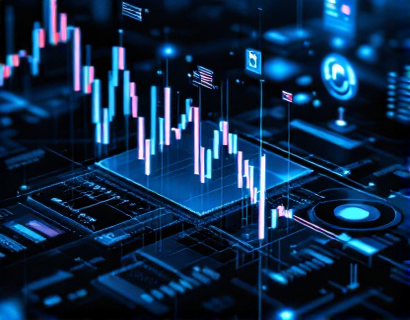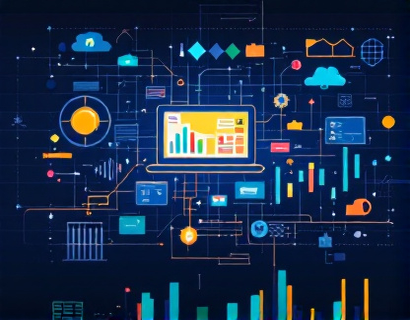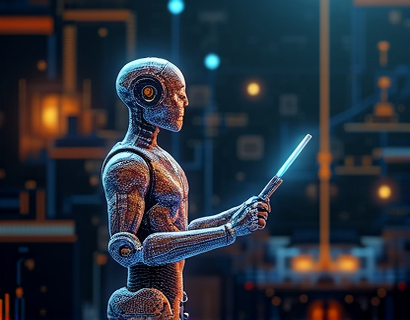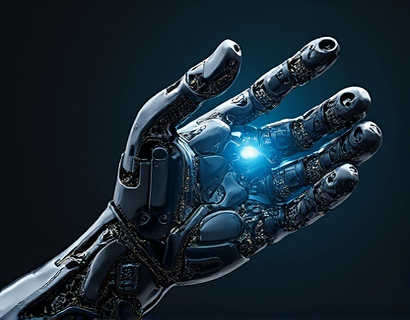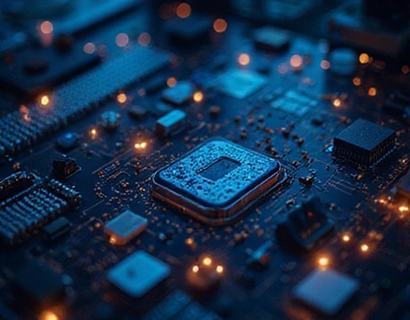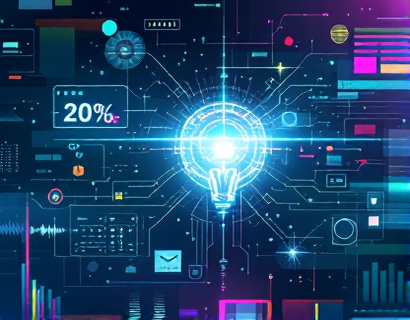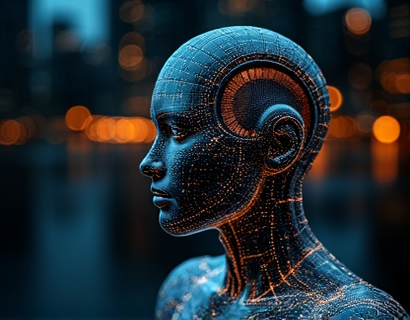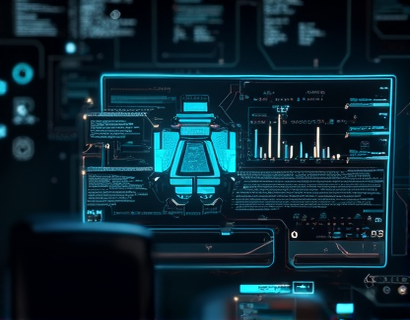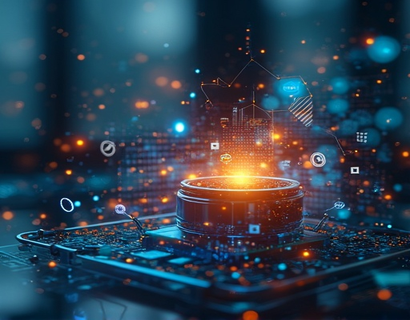AI and Crypto: Transforming Finance and Tech with Smart Solutions for Enhanced Digital Experiences
The integration of artificial intelligence (AI) and cryptocurrency is ushering in a new era of digital finance and technology. This fusion is not just a technological advancement but a paradigm shift that is redefining how we interact with financial systems and digital services. The synergy between AI and crypto is creating smarter, more efficient, and user-friendly solutions that are setting new standards in the tech and finance sectors. This article delves into the transformative impact of this combination, exploring innovative solutions that enhance user experiences and pave the way for the future of smart, integrated digital services.
The foundation of this transformation lies in the unique capabilities of AI and the decentralized nature of cryptocurrency. AI brings intelligence, automation, and predictive analytics to the table, while cryptocurrency offers a secure, transparent, and borderless means of transaction. When combined, these technologies can address some of the most pressing challenges in the current financial and tech landscapes, such as security, efficiency, and user engagement.
Enhanced Security through AI and Crypto
One of the primary benefits of integrating AI with cryptocurrency is the significant enhancement in security measures. Traditional financial systems are often vulnerable to fraud, hacking, and other cyber threats. AI algorithms can detect and prevent these threats in real-time by analyzing patterns and anomalies in transaction data. Machine learning models trained on vast datasets can identify suspicious activities and flag them for review, reducing the risk of fraudulent transactions.
Moreover, blockchain technology, the backbone of cryptocurrency, inherently provides a high level of security through its decentralized and immutable ledger. AI can further bolster this by optimizing blockchain protocols, improving consensus mechanisms, and enhancing smart contract security. For instance, AI can predict potential vulnerabilities in smart contracts and suggest improvements before they are exploited. This dual approach ensures that both the data and the infrastructure are robust against cyber threats.
Improved User Experience with AI-Driven Interfaces
The user experience in digital finance and tech is being revolutionized by AI-powered interfaces. Traditional interfaces can be cumbersome and difficult to navigate, especially for users who are not tech-savvy. AI-driven interfaces, on the other hand, are intuitive and adaptive, learning from user behavior to provide personalized experiences. For example, chatbots powered by natural language processing (NLP) can assist users in real-time, answering queries and guiding them through complex processes with ease.
Additionally, AI can analyze user preferences and behavior to recommend products and services tailored to individual needs. This level of personalization not only enhances user satisfaction but also increases engagement and loyalty. In the context of cryptocurrency, AI can help users manage their digital wallets more effectively, providing insights into transaction patterns, budgeting, and investment strategies.
Optimized Trading and Investment with AI
The trading and investment landscape is undergoing a significant transformation thanks to AI. Traditional trading relies heavily on human intuition and analysis, which can be limited by cognitive biases and the sheer volume of data. AI algorithms can process and analyze vast amounts of data in real-time, identifying trends and making predictions with a level of accuracy that surpasses human capabilities. This leads to more informed decision-making and potentially higher returns.
Automated trading bots, powered by AI, can execute trades based on predefined strategies and real-time market data. These bots can operate 24/7 without fatigue, capturing opportunities that human traders might miss. Furthermore, AI can help in risk management by continuously monitoring market conditions and adjusting strategies accordingly. This level of automation and precision is particularly valuable in the volatile world of cryptocurrency trading.
Decentralized Finance (DeFi) and AI
Decentralized Finance (DeFi) is an emerging sector that leverages blockchain technology to create financial systems without central intermediaries. AI plays a crucial role in enhancing DeFi platforms by improving liquidity, optimizing lending and borrowing, and enhancing security. AI algorithms can predict market movements and optimize asset allocation, helping users maximize their returns while minimizing risks.
Smart contracts, a core component of DeFi, can be made more robust and efficient through AI. AI can analyze and verify the conditions within smart contracts, ensuring they are executed correctly and securely. This reduces the risk of errors and fraud, making DeFi more accessible and trustworthy. Additionally, AI can facilitate cross-chain interoperability, allowing different blockchain networks to work together seamlessly, thus expanding the ecosystem and enhancing user experience.
Supply Chain and Logistics with AI and Crypto
The supply chain and logistics industry is another area where AI and cryptocurrency are making a significant impact. Traditional supply chains are often opaque, inefficient, and prone to fraud. AI can enhance transparency and efficiency by tracking products from origin to destination in real-time. Blockchain ensures that all transactions are recorded immutably, providing a tamper-proof record of the supply chain process.
Cryptocurrency can facilitate seamless and secure transactions within the supply chain, reducing the need for intermediaries and lowering costs. AI can optimize routes, predict demand, and manage inventory, ensuring that goods are delivered promptly and efficiently. This combination not only improves operational efficiency but also enhances trust and accountability among all parties involved.
Healthcare and AI-Driven Cryptocurrency Applications
In the healthcare sector, AI and cryptocurrency are converging to create innovative solutions that improve patient care and data management. AI can analyze medical data to predict disease outbreaks, personalize treatment plans, and streamline administrative tasks. Cryptocurrency can be used to create secure and private health data exchanges, giving patients control over their medical records while ensuring data integrity.
For instance, AI-powered platforms can use blockchain to create decentralized health records, allowing patients to share their medical information with healthcare providers securely and efficiently. This not only enhances patient care but also reduces the administrative burden on healthcare systems. Additionally, cryptocurrency can be used for micropayments in healthcare, enabling patients to pay for services directly and transparently.
Education and AI-Centric Cryptocurrency Platforms
The education sector is also benefiting from the integration of AI and cryptocurrency. AI-driven educational platforms can personalize learning experiences, adapting to the pace and style of each student. Cryptocurrency can be used to create tokenized education systems, where learners earn tokens for completing courses and contributing to the community. These tokens can be used to access premium content, participate in governance, or even traded for other assets.
AI can enhance the effectiveness of these platforms by analyzing learning data to identify areas where students need improvement and recommending tailored resources. This creates a more engaging and effective learning environment, making education more accessible and affordable. The use of cryptocurrency ensures that these systems are decentralized and resistant to censorship, promoting educational freedom and innovation.
Challenges and Considerations
While the potential of AI and cryptocurrency is vast, there are several challenges and considerations that need to be addressed. Regulatory frameworks are still evolving, and the lack of clear guidelines can create uncertainty for developers and users. Ensuring compliance with existing laws while innovating is a delicate balance that requires collaboration between stakeholders.
Another challenge is the technical complexity involved in integrating AI with blockchain and cryptocurrency systems. Developing robust and scalable solutions requires expertise in both domains, which can be a barrier for some organizations. Additionally, there is a need for greater public awareness and education to build trust and adoption of these technologies.
Future Prospects
The future of AI and cryptocurrency is bright, with numerous opportunities for growth and innovation. As technology advances, we can expect more sophisticated AI algorithms and more secure blockchain protocols. The convergence of these technologies will likely lead to the development of new financial instruments, enhanced digital identity solutions, and more efficient marketplaces.
Moreover, the rise of Web3, a decentralized internet powered by blockchain, AI, and other emerging technologies, promises a more user-centric and secure digital experience. AI will play a pivotal role in making Web3 accessible and user-friendly, ensuring that the benefits of these technologies are widely available.
In conclusion, the integration of AI and cryptocurrency is transforming finance and tech in profound ways. By enhancing security, improving user experiences, optimizing trading, and revolutionizing various industries, this fusion is setting new standards for smart, integrated digital services. As we continue to explore and harness the potential of these technologies, the future looks promising for a more connected, efficient, and innovative world.




